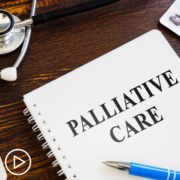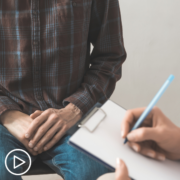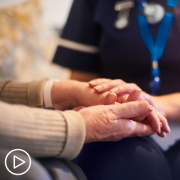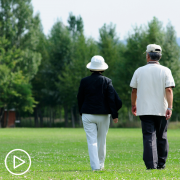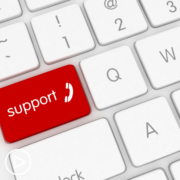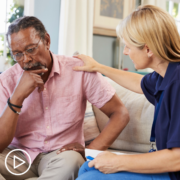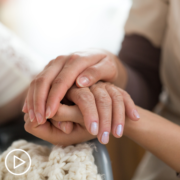MPN Patient Q&A: How Did You Avoid Obstacles to Receiving the Best Myeloproliferative Neoplasm Care from Patient Empowerment Network on Vimeo.
In 1991, there were few myeloproliferative neoplasm (MPN) experts. Many MF, ET, and PV patients were misdiagnosed and often received dismissive care. MPN patient Nona Baker shares how her diagnosis with two MPNs – essential thrombocythemia (ET) and polycythemia vera (PV) changed her life.
This program provides one patient’s perspective. Please talk to your own doctor to make healthcare decisions that are right for you.
See More from Best MPN Care No Matter Where You Live
Related Resources:
Transcript:
Dr. Nicole Rochester:
Hello and welcome. I’m Dr. Nicole Rochester, I’m a physician, a health advocate, the CEO of your GPS Doc, and the host for today’s Patient Empowerment Network program. I’d like to start by thanking our partners, MPN Alliance Australia and MPN Voice for their support. Today we’ll be doing an MPN patient question and answer session, talking directly to a patient living with an MPN for over 30 years. The goal is to help learn how to avoid obstacles to the best MPN care. Following this program, you will receive a survey and we’d be delighted to get your feedback, this helps inform future programs that we produce, please remember that this program is not a substitute for seeking medical care, so please be sure to connect with your healthcare team on what the best options may be for your medical care. I am proud and honored to introduce Nona Baker. Nona was diagnosed in 1991 with essential thrombocythemia, also known as ET, and then in 2004 with polycythemia vera also known as PV. Nona is a staunch patient advocate and the co-chair of MPN Voice where she counsels MPN patients around the world on how to connect to the best care. We are so happy that you have tuned in to learn about Nona’s journey and tips that she has for you and your family as you face an MPN diagnosis as well as how to navigate your care and gain clarity on your path to empowerment. Thanks for joining us, Nona.
Nona Baker:
Thank you and thank you to Patient Empowerment Network for giving me this opportunity to share my experience and hope for other patients as they navigate their way through the MPN diagnosis and treatments.
Dr. Nicole Rochester:
Wonderful, so Nona in 1991, when you were first diagnosed, there were very few experts in MPN. Many MF, ET, and PV patients were misdiagnosed, and they often received dismissive care, because there were just so many unknowns at the time, and sadly, this was part of your journey and we’re going to learn a little bit more about that shortly. We received a number of questions about how you navigate treatment early in the course of your diagnosis, your initial diagnosis was actually more of an assumption, and I’d love for you to briefly speak more about that.
Nona Baker:
Thank you. It was a fairly scary time, I have to admit because so little was known about MPNs or MPDs in those days, myeloproliferative disorders, blood disorders, and my journey was very much a checkered journey, starting with being sent to an orthopedic surgeon, who I then had to go into physiotherapy for painful feet and insoles in my shoes. I was sent to a rheumatologist who took one look at my blood work and that’s when he said, I think you’ve got an alcohol problem. My husband actually was sitting beside me and he said to him, he said, I think you’ve got that wrong, she doesn’t really drink. And the doctor then turned around, they said, Well, maybe the machines have got it wrong, so that was quite a scary thing, it was…I knew there was something wrong, but I’d been what we call here around the hoses, and it wasn’t until I…the rheumatologist asked for a new set of blood work that he called me two days later that I’ve made an appointment for you to see a hematologist and his call was on a Saturday morning on Monday, two days later, and then I can tell you I was really scared.
Nona Baker:
Really, really scared. The other thing it did is I kind of didn’t trust what I was being told, the one thing I was told was there were only 12,000 known patients in the country, I’m not sure that gave me a great deal of confidence, but yeah, it wasn’t an easy start it was very scary.
Dr. Nicole Rochester:
Wow, I appreciate you sharing that, and I’m sure that many people with MPNs and other rare diagnoses can relate to that journey. Well, let’s take a look at your brief vignette that sheds a little more light on your unconventional path to care…let’s watch.
Wow, well, the good news is Nona, we have come a long way, but of course, we still have a ways to go. Would you agree with that?
Nona Baker:
I couldn’t agree with that more. I hear so many patients through my work with caring forums that we do from London, that go out around the world who go and don’t get the right information and get quite scared still by what’s going on, and I think things like we’re doing now today help empower people to know that they can actually claim ownership of their MPN and ask for and have a right… Well, certainly in this country to ask for a second opinion and get to the right care to meet their needs.
Dr. Nicole Rochester:
Absolutely, and you are speaking my language as a health advocate, I am always talking with people about the importance of using their voice, standing up for themselves and seeking information, and asking questions, so I love that you have opened our program with that. So with that, let’s go ahead and get our questions, the first question comes from Susan, and Susan asks, “After the initial shock of your diagnosis, were you worried about limited treatment options and specialists, and then what was your next step?”
Nona Baker:
Was I worried? Well, I was just generally anxious because it’s this thing of not being in control of one’s body and having to surrender that control to another person, so that’s the scary bit for me, and then I did something a little bit stupid in hindsight because it was the early days of the internet, man, I did Dr. Google, not a good plan, because particularly in the very early days, there was some really, really sort of dreadful prognosis is almost sort of go from right, you will…which, of course, here I am, 30 years on. And so, I think that I would be very cautious even now in using Dr. Google, I would go to safe sites where they are medically monitored because I think a little knowledge can be very dangerous.
Dr. Nicole Rochester:
That is so true. And I just want to highlight that because in medicine, we often kind of jokingly talk about Dr. Google, but it really is a phenomenon, and while there’s this balance of patients with rare diseases being able to find information and empower themselves, but then as you mentioned, known a lot of the information on the internet has not been vetted, some of it is not scientifically accurate, and it can literally have you pulling your hair out as you read these accounts and start to really create more worry as opposed to creating action stuff. So, I appreciate you sharing that.
Our next question is from Alice and Alice says, “I’ve noticed among women, minority groups and underserved communities, that there’s often a dismissive tone or atmosphere when you speak up and share your concerns,” and she wants to know, “Nona, do you feel that being a woman played a role in your initial diagnosis?” And she also like to understand how to communicate concerns with the care team when you feel that you’re being dismissed.
Nona Baker:
That’s an interesting question, I have to be honest and say I didn’t experience that, but I’m well aware of that. And it goes on, and it’s really disempowering to feel that, so I have huge empathy to hear that. I think if I had experienced it, which I obviously didn’t experience it, my key tip here would be when going for an appointment with a clinician, take a notebook and a pen and write down what you want to ask them, and write down their answers, and preferably if you can take somebody with you, because then you have that opportunity afterwards to digest what you’ve been told, and that in itself is empowering because you can then make further choices.
Dr. Nicole Rochester:
I love that, Nona. Also, advice that I always give to clients, and you’re right, having someone with you and writing things down is so important, especially in these situations where you’re getting a diagnosis, there’s a lot of uncertainty. We know that a lot of the information that’s shared in medical appointments goes in one ear and out of the other, particularly if we’re anxious or concerned or worried, so having that second person in the room is so incredibly important. I appreciate that advice. All right, our next question comes from Charles. He says, some patients living with two MPNs have said that they’re living with two cancers,” and he goes on to say that he’s been confused as to whether MPNs are cancers or blood disorders. Do you feel comfortable speaking to that and setting the record straight based on how you counsel other advocates in this space, he also mentions that his wife is living with ET and PV as well, and that sometimes the language can be very confusing.
Nona Baker:
I absolutely agree. And interestingly, we did a virtual forum for…at the weekend and one of the research projects, there has been only impacting on families, and it’s very interesting that the language can be very…again, disempowering the word cancer, I think the conventional word cancer is almost…it’s a deaf nail, but actually, when I challenged on the medication, I had the word cancer was used, I went to my primary GP physician, and I asked him,” nobody’s told me I’ve got cancer. What’s this?” Because at the time, it was a blood disorder and it said cancer, and he said,” Do you know what cancer means, Nona?” He said, “It means a proliferation of cells, but these are confined to the bone marrow.” But what happened for us as patients, as we started off, or certainly I did with a blood disorder, and then the World Health Organization, because of this perforation of cells re-classified that as a neoplasm, a neoplasm is just another word for cancer. So, it hasn’t changed since I was diagnosed, but the words have changed. And the scariest is in the word neoplasm suddenly here in the UK, it’s been an advantage, because we have access to much better drugs than we would have had if we’ve just been a disorder. I can’t speak for other health authorities or other countries, because each country is different, but I think it’s just simplifying it. Simplifying the language. That’s empowering in itself.
Dr. Nicole Rochester:
I agree, and language is everything, and I think the key is what you said, that while there is a proliferation and while some may use the word cancer that it is confined, and I think that that provides a lot of clarity. Alright, we also have a question from Julie. Julie says, “I was given the run-around early on in my journey and wasted valuable time,” and she wants to know, what are some questions or actions to take at the outset when ruling out MPNs?”
Nona Baker:
That’s a difficult question because I think everybody is different and every health service is different. I think if you’re in an area where the clinicians don’t necessarily know too much about MPNs, that can be problematic. We’re a small country here and we have access to some really good hospitals that specialize in MPNs. I think, again, it’s going back with your piece of paper saying, can we rule out that I’ve got an MPN and I’ve read about MPNs, I have the symptoms, whether it’s fatigue or whether it’s itch for PV or whatever the symptoms are, and I’ve seen that that can be a symptom of an MPN. And again, take a piece of paper, and say can we rule that out? You know, I think that’s empowering.
Dr. Nicole Rochester:
I agree. Nona and I think when counseling patients who have had misdiagnosis or long road to accurate diagnoses, what you just said is key, and a lot of times it’s a matter of opening up the minds of your physicians and your healthcare team, and like you said, if they’re not familiar with MPNs, then they may go down a path of giving you a different diagnosis, but if you’ve done a little research or if you have some concerns, just saying, could it be this…I know that you think I have this condition, but based on what I’ve read, based on what I’ve learned, could it be an MPN? And a lot of times just that suggestion is enough to kind of shift the conversation, so I think that’s wonderful advice. Alright, our next question comes from Edna. And Edna says that in your in yet you stated that you were diagnosed at 41 and that you are a busy mom and that you were working, and she wants to know, “How did you share this diagnosis with your children and how did it impact your work in your career?”
Nona Baker:
It’s a very interesting question, and I think my children, because I had sort of my mom’s painful feet and I have packets of mushy peas that used to be put on my feet because they were painful because of the obviously thick blood, and my younger son has done a lot of fundraising for MPN Voice, and he talked about how as an 8-year-old, he’d grown up with me having these symptoms that I haven’t done much about, and I know I’ve always taken the view for me, and this is only for me, that I don’t let my MPN define who I am. You know, I think it’s part of my life. It isn’t my life, because my fear would be after that initial anxiety and fear that if I allowed it to take over my life, it would actually really impact my younger…my young children…in terms of my work, I only work part-time. You know, the other thing is, yes, I got a lot of fatigue, but I think what I’ve learned over the years is to put your hands up and say, you know, I’ve hit a wall whereas I just take five minutes.
Nona Baker:
Just take that time. Whereas sometimes it’s difficult when you’re a mom with young children, and I think now, people tend to explain it a bit to their young children, when mom’s tired, it’s not because it’s anything you’ve done it, because I remember patients describing it to have children is…it’s like a car, when the oil in the car gets too thick, the car slows down and sometimes the car needs to stop, and she equated her blood as the oil in the car that sometimes it just slows down and then has to stop gets a bit of refueling, I thought that was a good definition for young children.
Dr. Nicole Rochester:
I love that, I love that, and I’m a pediatrician by training, so I love putting things in clear terms for kids, and I think that’s really important to just make it simple for them. I also really like what you said, Nona about the self-care part, I think that can be really difficult sometimes for even women who may not have chronic diseases, but certainly for women and moms who have chronic diseases and feeling that, feeling guilty when they take time for themselves, even if it’s in the context of their illness, and so needing to rest and explaining that and normalizing that mom needs to take a nap, I think is incredible, and I love that your son is involved in the advocacy work that you do for MPN. All right, we have a question from James. James says, “Are there specific lifestyle changes that you may, following your diagnosis that brought relief to any symptoms that you were having?”
Nona Baker:
Well, the first change I had to make was I used to smoke, and then my hematologist said to me that affects the red cell count, and that was the incentive to absolutely give up smoking there, and then that was my first lifestyle change, and I haven’t regretted it for a single day. Other lifestyle changes, not really, other than just becoming aware that you know to fight fatigue doesn’t help, sometimes you have to surrender to it, but definitely give up smoking and I… you know, I think that…well, nowadays people don’t smoke, but we’re talking 30 years ago, so…yeah, 30 years is pretty well since I’ve had a cigarette…
Dr. Nicole Rochester:
Well, kudos to you for giving up smoking that…that is a challenge. So that’s wonderful. All right, we have a question from Janet. Janet says, I have noticed that many MPN patients develop a second MPN over time, and she wants to know. She wants to know, “Were you surprised about your PV diagnosis over a decade after your first diagnosis, or is this something that you were perhaps prepared for by your medical team?”
Nona Baker:
Well, my second diagnosis came by chance because I had a problem with fibroids, which necessitated having a hysterectomy, which so, the natural venesection was taken away, and then it evolved to a… I don’t know whether that’s the reason, but then I was diagnosed with PV, which means that I have PV with high platelets now is I think the way in my hematologist describes it, but it’s certainly under control with the medication and with venesection from time to time. So, was I surprised? I don’t think after my journey, I don’t think anything surprised me really, I sort of…I think, again, I took ownership of it and just got on with it, really.
Dr. Nicole Rochester:
Excellent, thank you, Nona. As we prepare to close, is there one tip or one piece of advice that you would like to give to individuals with MPN?
Nona Baker:
Don’t be afraid to ask a question, because I think living with a fear of something is really not good for one’s general health because fear and anxiety can, I think, impact a physical illness if you’re living with a lot of fear in a lot of anxiety, and I know this is easy for me to say because I’ve had a relatively easy journey, and I’ve met patients who’ve had a really, really tough time and I know through Pan-voice, people that were diagnosed either shortly after me or some before who had a bone marrow transplant, you know, their life is obviously better, but my goodness…what they went through to get where they are now. But I think the whole thing that we’ve been talking about really is just find that voice, and even if it’s not with the clinician, share it with a friend, you don’t sit on fear, share it with a friend, have a body, have an ally, and one of the things we do at MPN Voice, which actually I think has helped enormously, is we have a buddy program there where you would be…you will be matched with somebody who has been diagnosed for at least two years that can buddy you along emotionally, because I don’t underestimate the emotional impact that that affects a lot of us.
Nona Baker:
And I think we need to have that voice to say, yes, it is a bit of a shock, but I’m not going to let it define me and wreck my life. If you can do that, I think life will be easier.
Dr. Nicole Rochester:
That is awesome. Don’t sit on fear. I’m going to carry that with me. Nona, I appreciate that. Well, that’s all the time that we have for questions. Nona, I want to thank you for taking this time to share your story with me and for everyone watching, and just to recap, we’ve learned that avoiding obstacles to the best MPN care means remembering that everyone’s journey is going to be different. We learned the importance of not allowing your disease to consume your life, and we’ve also learned the importance of using your voice because we are truly our own best advocates, it’s these actions that are key to staying on your path to empowerment. Thank you so much again for joining us, Nona, this has been amazing.
Nona Baker:
Thank you for giving me the time to speak to the patient community.
Dr. Nicole Rochester:
I’m Dr. Nicole Rochester, thank you again for joining this Patient Empowerment Network program.




